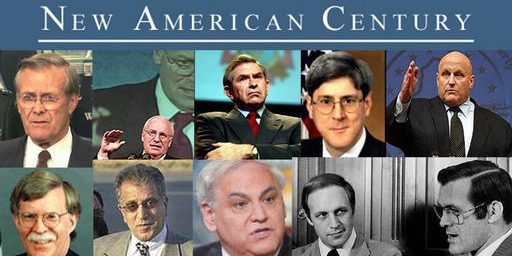Neocons Versus Liberal Interventionists
Dan Drezner asks and answers an interesting question:
[A]re people who reject Bush’s current foreign policy are promoting something that looks awfully similar on a lot of dimensions? Is Francis Fukuyama’s “realistic Wilsonianism” so different from plain vanilla neoconservatism? Is George Clooney clamoring for intervention in Darfur any different from the humanitarian impulse (yes, there were others) that led neocons to clamor for intervention in Iraq (a point some on the left recognize)? Is the only difference between Republicans and Democrats a slight variant in the realism-idealism mix?
Actually, yes, I think there is a difference — but it’s about process and not preferences. The primary difference between liberal interventionists and neocons is that the former group thinks intervention is more successful if it takes place through the multilateral route. Multilateralism acts as a “pleasing illusion” to simultaneously obscure and enhance American power.
Which is great, when it works — except that neocons raise a valid point when they highlight how difficult it is to get mulilateralism to work.
[…]
This is one reason why Fukuyama’s “multi-multilateralism” concept intrigues me. In a world of multiple, overlapping international institutions, forum-shopping becomes a possibility. This allows realpolitik tactics within an institutionalist rubric. That said, Darfur shows the limitations of this gambit when there is a lack of consensus.
Quite right. It’s not really a criticism of the U.N. Charter to say, as I have repeatedly, that the Security Council is virtually worthless as an instrument of public policy. It’s simply an indication of the enormity of the ambitious task they undertook.
It amazes me that, as Charles Krauthammer so brilliantly phrased it fifteen years ago,
A large segment of American opinion doubts the legitimacy of unilateral American action but accepts quite readily actions undertaken by the “world community” acting in concert. Why it should matter to Americans that their actions get a Security Council nod from, say, Deng Xiaoping and the butchers of Tiananmen Square is beyond me. . .
This logic is deeply puzzling. How exactly does the Security Council confer moral authority on American action? The Security Council is a committee of great powers, heirs to the victors in the Second World War. They manage the world in their own interest. The Security Council is, on the very rare occasions when it actually works, realpolitik by committee. But by what logic is it a repository of international morality? How does the approval of France and Russia, acting clearly and rationally in pursuit of their own interests in Iraq (largely oil and investment), confer legitimacy on an invasion? [Quote]
Yet I sat in an academic conference during the run-up to the Iraq war wherein a number of panelists gave papers arguing that going to war with Iraq was unethical, mostly because it was not being done under Security Council auspices and therefore in violation of international law. When I asked in the Q&A whether the war would be any more moral, given the identical circumstances, if France et. al. bought off on it, they all thought it would be. That strikes me as more than a bit odd.
I understand the tactical advantages of what Krauthammer dubbed “pseduo-multilateralism.” It makes sense to work with allies when one can, for a variety of reasons. Sometimes, the inability to secure allies might also make an otherwise close call go the other way. Neither of those has anything to do with morality, though.





It sounds to me like we’re re-hashing the universal morality, legitimacy, authenticity debate.
To a large degree, yes. As Dan notes, it’s unending. Presumably, it’s because people can’t come to common ground on key precepts.
It’s worth rehashing these things from time to time, though. Most blog readers are unlikely to pay attention to such esoteria.